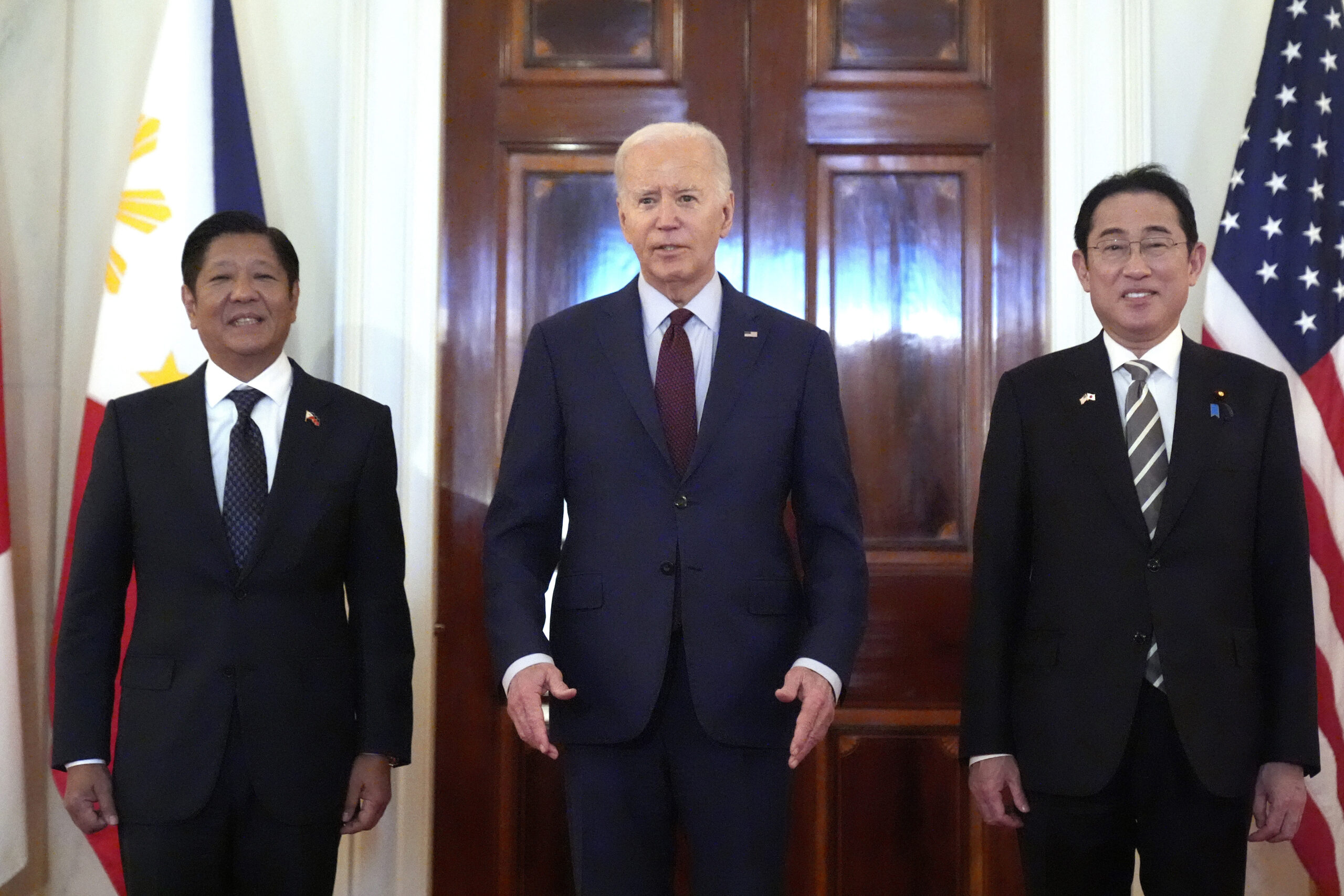US, Japan, PH to China: Stop ‘coercive use’ of coast guard in SCS

US President Joe Biden (center), Philippine President Ferdinand Marcos Jr. (left), and Japanese Prime Minister Fumio Kishida pose before a trilateral meeting in the East Room of the White House in Washington, Thursday, April 11, 2024. (AP Photo/Mark Schiefelbein)
WASHINGTON, D.C., United States — The heads of state of the Philippines, US, and Japan have called on China to stop using its coast guard in a coercive manner.
They also reminded China that ownership of several areas in the West Philippine Sea has been settled in the July 2016 ruling of the Permanent Court of Arbitration (PCA)
In a joint statement released on Thursday night (Eastern time), President Ferdinand Marcos Jr., US President Joe Biden, and Japanese Prime Minister Kishida Fumio expressed their serious concerns over China’s aggressive behavior in the South China Sea.
They specifically mentioned the Ayungin (Second Thomas) Shoal, which China says it owns. They said the PCA ruling has addressed the issue regarding the shoal when it invalidated China’s sweeping nine-dash line territorial claim.
Article continues after this advertisement“We express our serious concerns about the People’s Republic of China’s (PRC) dangerous and aggressive behavior in the South China Sea,” the three leaders said.
Article continues after this advertisement“We are also concerned by the militarization of reclaimed features and unlawful maritime claims in the South China Sea.”
“We steadfastly oppose the dangerous and coercive use of Coast Guard and maritime militia vessels in the South China Sea, as well as efforts to disrupt other countries’ offshore resource exploitation,” they added.
The three leaders continued: “We reiterate serious concern over the PRC’s repeated obstruction of Philippine vessels’ exercise of high seas freedom of navigation and the disruption of supply lines to Second Thomas Shoal, which constitute dangerous and destabilizing conduct.”
“The final and legally binding July 12, 2016 Arbitral Tribunal determined that this feature lies within the Philippines’ exclusive economic zone, and we call on the PRC to abide by the ruling,” they also said.
Ayungin Shoal, which sits around 315 kilometers from the tip of Palawan, is well within the West Philippine Sea, being inside the 370-kilometer exclusive economic zone of the country.
However, China believes the Philippines is illegally occupying the shoal by deliberately parking Navy ship BRP Sierra Madre in Ayungin in 1999. China also claimed that a former Philippine president promised to remove BRP Sierra Madre from Ayungin, but President Marcos said he is not aware of such a deal.
Aside from the West Philippine Sea issue, Marcos, Biden, and Kishida also discussed other matters related to China such as its claim over Japan-controlled Senkaku Islands and long-time insistence on Taiwan being a mere province of the mainland.
“We express our serious concerns regarding the situation in the East China Sea, and reiterate our strong opposition to any attempts by the PRC to unilaterally change the status quo by force or coercion in the East China Sea, including through actions that seek to undermine Japan’s longstanding and peaceful administration of the Senkaku Islands,” they said.
“We affirm the importance of peace and stability across the Taiwan Strait as an indispensable element of global security and prosperity, recognize that there is no change in our basic positions on Taiwan, and call for a peaceful resolution of cross-Strait issues,” they added.
To address these security concerns over the Indo-Pacific region and to improve interoperability between the three countries, leaders have agreed to start joint maritime exercises in 2025.
“Within the next year, our coast guards also plan to conduct an at-sea trilateral exercise and other maritime activities in the Indo-Pacific to improve interoperability and advance maritime security and safety. We announce the establishment of a trilateral maritime dialogue to enhance coordination and collective responses to promote maritime cooperation,” the leaders said.
“We are concerned about illegal, unreported, and unregulated fishing. We support the ability of Filipino and Japanese fisherfolk to pursue their traditional livelihoods. To build regional capacity and address threats posed by transnational crime, illegal, unreported, and unregulated fishing, and other maritime challenges, Japan, the Philippines, and the United States plan to expand our efforts to provide maritime law enforcement training and support to partner countries in the region,” they added.
The trilateral meeting between the Philippines, US, and Japan comes in the midst of an increased tension in the South China Sea.
Over the past few months, the Philippine Coast Guard (PCG) has regularly complained about the Chinese Coast Guard’s harassment of local vessels assisting resupply missions to troops stationed in Ayungin Shoal.
During the start of the three-way meeting, Biden reiterated that any attack on a Philippine aircraft, vessel, or armed force in the South China Sea will invoke the Mutual Defense Treaty that requires both the US and the Philippines to send support if a party is being attacked.
For comprehensive coverage, in-depth analysis, visit our special page for West Philippine Sea updates. Stay informed with articles, videos, and expert opinions.